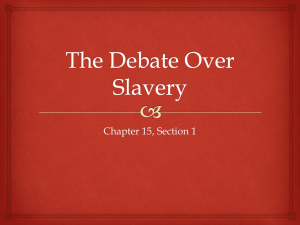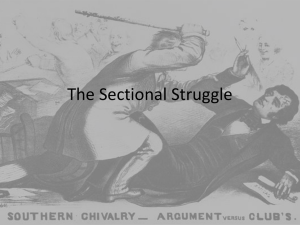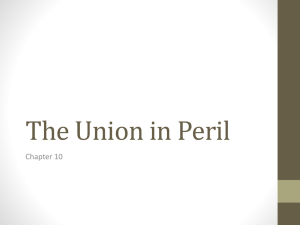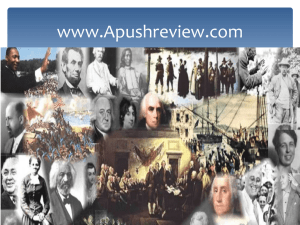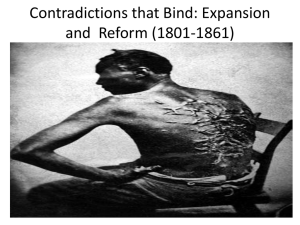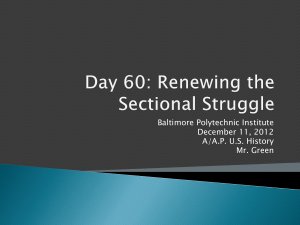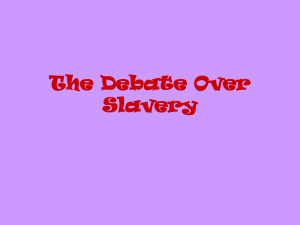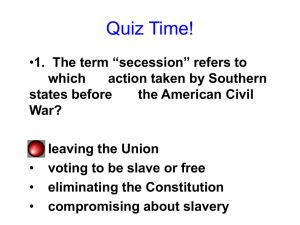Ch. 18 PowerPoint
advertisement
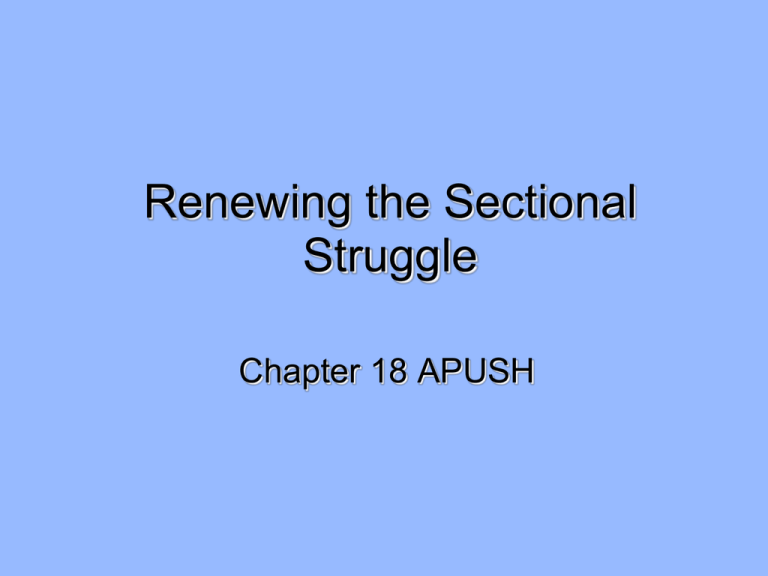
Renewing the Sectional Struggle Chapter 18 APUSH The Popular Sovereignty Panacea 1848 • Post Mexican War & Treaty of Guadalupe Hidalgo – Northern anti-slavery advocates backed Wilmot Proviso – South worried about slavery in western areas – Whig and Democratic Parties split along North/South line Free Soil Party Free Soil! Free Speech! Free Labor! Free Men! Industrialists who wanted higher protective tariffs “Barnburners” – discontented northern Democrats. Anti-slavery members of the Liberty and Whig Parties. Opposition to the extension of slavery in the new territories! (Supported Wilmot Proviso) WHY? The 1848 Presidential Election Results √ Hero of Buena Vista Father of “popular sovereignty” Free Soil GOLD! At Sutter’s Mill, 1848 John A. Sutter California Gold Rush, 1849 49ers California Gold Fever • Huge numbers of people flocking to California caused problems – Increase in crime – When the territorial government failed to protect its citizens, people turned to vigilante justice • Behind the scenes, President Taylor encourages California to draft a Constitution that excludes slavery and then apply for admission to the U.S. as a state Sectional Balance and the Underground Railroad Problems of Sectional Balance in 1850 ß California statehood. ß Southern “fire-eaters” threatening secession. ß Underground RR & fugitive slave issues: Personal liberty laws South in 1850 SOUTH HAPPY •Zachary Taylor as president •Majority on Supreme Court •Outnumbered in the House •Equal in the Senate •Cotton expanding- profits high BUT SAD BECAUSE… •15 free and 15 slave states •California admission is a problem •New Mexico and Utah want admission as free state •Texas claims part of New Mexico •Northerners want to end slavery in Washington DC •Runaway slaves assisted by Underground RR Impact of the Underground Railroad • Harriet Tubman- rescues over 300 slaves • In 1850, the South was losing roughly 1,000 slaves per year through the Underground Railroad and runaways • Led the South to push for a new, and harsher Fugitive Slave Law – Northerners refusing to follow the Constitution and the Fugitive Slave Act of 1793 Twilight of the Senatorial Giants • Clay’s last great compromise. Urged both Henry Clay sides to make concessions, and the North allow a tougher fugitive-slave law Aided by Senator Stephen A. Douglas (Illinois) • John C. Calhoun’s championed the South in his last great speech (two Presidents, each with a John C Calhoun veto, approved of Clay’s purpose, but said they did not provide enough safeguards for the rights of Southern states. Daniel Webster •Uphold Clay’s measures - urged concessions like the Fugitive Slave Law. Why worry because the good Lord had decreed through geography and climate that slavery won’t last in new Mexican territories (bankers of North liked this as they won’t lose investments in South) • Webster’s Seventh of March Speech turned the tide in the North toward compromise. Twilight of the Senatorial Giants Daniel Webster Slavery is evil but disunion is a worse evil. He despised abolitionists and never joined their ranks Deadlock and Danger on Capitol Hill Young Guard of North speaks in the Senate- more interested in purging and purifying the nation than patching it up and preserving it •William Seward - strongly antislavery - appeal to a “higher law” than the Constitution Zachary Taylor President I’m with Seward I’m vetoing any Compromise! Compromise of 1850 (over the land acquired • • • • • specifically from the Mexican War). Texas would relinquish the land in dispute but, in compensation, be given 10 million dollars -- money it would use to pay off its debt to Mexico. The territories of New Mexico, Nevada, Arizona, and Utah would be organized without mention of slavery. (The decision would be made by the territories' inhabitants later, when they applied for statehood.) Regarding Washington, the slave trade would be abolished in the District of Columbia, although slavery would still be permitted. Finally, California would be admitted as a free state. To pacify slave-state politicians, who would have objected to the imbalance created by adding another free state, the Fugitive Slave Act was passed. Luckily…. • Taylor dies • Millard Fillmore (lawyer from NY) takes over Millard Fillmore • Fillmore, president due to Zachary Taylor’s death, supported the Compromise of 1850 and saw it as the “final settlement” of the question of slavery Compromise of 1850 What are the concessions to both sides? Temporary Peace • Who got the best deal? • Fugitive Slave Law FUGITIVE SLAVE ACT • the Fugitive Slave Act was the most controversial part of the Compromise of 1850 • It required citizens to assist in the recovery of fugitive slaves. • It denied a fugitive's right to a jury trial. (Cases would instead be handled by special commisioners -commisioners who would be paid $5 if an alleged fugitive were released and $10 if he or she were sent away with the claimant.) • The act called for changes in filing for a claim, making the process easier for slaveowners. • Also, according to the act, there would be more federal officials responsible for enforcing the law. Effects of Fugitive Slave Act • For slaves attempting to build lives in the North, the new law was disaster. – Many left their homes and fled to Canada. – During the next ten years, an estimated 20,000 blacks moved to the neighboring country. – For Harriet Jacobs, a fugitive living in New York, passage of the law was "the beginning of a reign of terror to the colored population." She stayed put, even after learning that slave catchers were hired to track her down. – Anthony Burns, a fugitive living in Boston, was one of many who were captured and returned to slavery. – Free blacks, too, were captured and sent to the South. With no legal right to plead their cases, they were completely defenseless. FURTHER EFFECTS. . . • Passage of the Fugitive Slave Act made abolitionists all the more resolved to put an end to slavery. • The Underground Railroad became more active, reaching its peak between 1850 and 1860. • The act also brought the subject of slavery before the nation. – Many who had previously been ambivalent about slavery now took a definitive stance against the institution. Was the Compromise a success? • The Compromise of 1850 accomplished what it set out to do -- it kept the nation united -but the solution was only temporary. Over the following decade the country's citizens became further divided over the issue of slavery. The rift would continue to grow until the nation itself divided. Why Not Begin The Civil War in the 1850s? • South - happy to since Northerners not following laws (Fugitive) and promises • North - time to expand and create more wealth and population • Time for moral strength of the North to build Defeat and Doom for the Whigs UPCOMING ELECTION OF 1852 • Democrats - Franklin Pierce- enemyless, inconspicuous, proSouthern northerner. Endorsed Compromise 1850 and Fugitive Slave Law • Whigs - didn’t pick Webster or Fillmore. Instead went with military guy- Gen Winfield Scott. OK with Compromise of 1850 • Whigs split and begin to die in this election. • End of national parties and rise of purely sectional parties. • RIP Whig Party - kept Union together through electoral strength in South and through leaders like Webster and Clay • Henry Clay and Daniel Webster both die during the 1852 campaign. 1852 Presidential Election √ Franklin Pierce Democrat Gen. Winfield Scott John Parker Hale Whig Free Soil 1852 Election Results Franklin Pierce Manifest Destiny • Nicaragua - William Walker • British challenged Monroe Doctrine Expansionist Young America in the 1850s American influence in Latin America in the 1840s and 1850s American Influence in Latin America • Treaty between the U.S. and New Granada (Colombia) in 1848- Americans get the right to transit across the isthmus of Panama in return for maintaining the neutrality of the route. • 1855- first “transcontinental railroad” completed • Clayton-Bulwer Treaty- U.S. and Britain agree that neither country would fortify or seek control over any future waterway • William Walker tries to gain control of Nicaragua, but the countries of Central America ally together to overthrow him, and he dies before a firing squad CUBA Sugar mills Ostend Manifesto - $120 million offered and if Spain refuses then US would be justified in taking Cuba (Monroe Doctrine) Northern free soilers furious Pierce recalls the Ostend Manifesto Spreading American influence in Asia • Treaty of Wanghia- U.S. and China – “Most favored nation” status- U.S. gets all trading terms given to other powers – “Extraterritoriality”- Americans accused of crimes in China to be tried by American officials, not Chinese courts – Secured by Caleb Cushing – Trade with China greatly increases, and new opportunities for missionaries Japan • Japan had been largely insulated from the outside world • July 1853- Commodore Matthew Perry sails into Edo (Tokyo) Bay – Promises to return in one year to get Chinese reply to request for free trade and friendly relations • Returns in February 1854 with more ships, gives the Japanese gifts • Treaty of Kanagawa signed on March 31, 1854 – Proper treatment of shipwrecked sailors – American coaling rights in Japan – Establishment of consular (diplomatic) relations • May have only been a foot in the door, but it blasts Japanese isolation wide open Pacific Railroad and Gadsden Purchase • Transportation problems after Mexican War • California and Oregon isolated • RR promoters - where run the line? Where end it? Run it south of Mexican border? • Gadsden Purchase 1853 • Where will that RR go? • Northerners argue that if running the railroad through organized territory is the argument, why not organize Nebraska? Douglas and KansasNebraska • Slice Territory of Nebraska into two territories, Kansas and Nebraska • Decision on slavery by popular sovereignty (assumption is that Kansas would become slave and Nebraska free • Doing this would require overturning the Missouri Compromise • Why do this? Personal gain for Douglas, angling for the presidency in 1856? • Douglas fails to see that hundreds of thousands of northerners are going to detest Douglas’ position on what they consider a moral issue. Kansas-Nebraska Act • Repeals the Missouri Compromise, and indirectly the Fugitive Slave Law of 1850 • Will shatter the Democrats • Leads to the emergence of the Republican Party – Dissatisfied Whigs, Democrats who opposed Kansas-Nebraska, Free-Soilers, Know-Nothings • SECTIONAL PARTIES HAVE EMERGED

